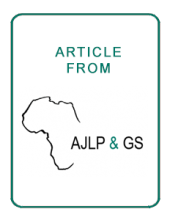/ library resources
Showing items 64 through 72 of 73379.This study is aimed to assess features of land governance arrangements in the Eastern Africa region. Comparative and qualitative research approach was employed to achieve the objectives of the study.
Artisanal and small-scale mining affects the quality and components of the environment in the Batouri area in different ways. Activities interfere with air, soil, water, fauna and forest resources.
Innovative technologies for land governance can promote clear land tenure and effective land administration, reduce corruption, and support economic growth. Mobile technologies offer real-time access to information and open communication between people and government services.
This paper underscores that corruption remains of key concern to land governance institutions in Africa, escalates costs of doing business and therefore undermines investments.
The Eastern Africa Land Administration Network has since 2006 been collaborating in the development of education, short courses for land professionals and research in the eastern Africa region.
This paper aims to explore implications of large-scale land investment for local citizenship, with a particular focus on customs and mobility. The concept of local citizenship is a neglected aspect of land investment debates.
This paper focuses on gender mainstreaming in modeling the impacts of climate change by development sector.
L’étude relative aux impacts des actions des ONG sur la gestion durable des aires protégées dans la reserve de Biosphere de Luki(RBL), dans la Province du Kongo central situées à l’Ouest de la RDC, montre que cette réserve regorge une diversité biologique particulière qui est soumise à une pressi
The aim of this paper is to highlight the determinants of women land access in Cameron and appreciate its effects on wellbeing trough income and consumption.
Paginación
Land Library Search
Through our robust search engine, you can search for any item of the over 64,800 highly curated resources in the Land Library.
If you would like to find an overview of what is possible, feel free to peruse the Search Guide.

